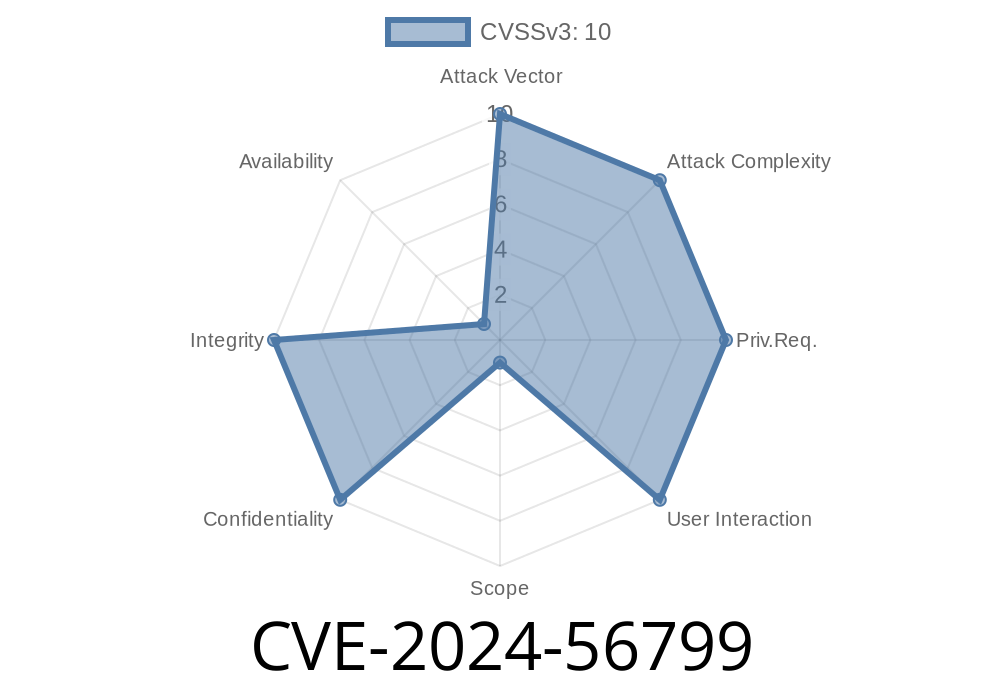Simofa has been making waves in the web development world as a handy tool to automate static website building and deployment. Its promise of simple automation and rapid deployments has landed it in plenty of modern developer stacks. But a major vulnerability—CVE-2024-56799—affecting Simofa versions prior to .2.7 could put your sensitive routes at serious risk by unintentionally exposing them to anyone on the internet.
In this guide, we’ll walk through what this vulnerability is, how it works, see some code snippets for better understanding, and review the exploit in plain English for anyone who wants to keep their site safe or learn from real-world security flaws.
What’s the Issue? A Design Flaw in RouteLoader
The vulnerability stems from a design mistake inside the RouteLoader class, which is responsible for loading and managing API routes in Simofa-based sites. Certain routes, which developers may expect to be protected or require authentication, end up being accessible to anyone.
Why Does This Happen?
In Simofa versions before .2.7, RouteLoader doesn’t properly check whether a route should require authentication. Instead, routes marked private—intended for authenticated users only—are publicly served unless extra checks are manually implemented.
Let's look at a hypothetical (but realistic) simplified version of the buggy RouteLoader logic
# simofa/routes.py
class RouteLoader:
def __init__(self):
self.routes = []
def add_route(self, path, handler, private=False):
self.routes.append((path, handler, private))
def handle_request(self, path, user=None):
for route in self.routes:
if route[] == path:
# BEFORE V.2.7 – Bug: This does NOT check if route is private
# and does not validate authentication!
return route[1](user)
return '404 Not Found'
The Patch in v.2.7
The fix in version .2.7 is simple and effective. A check is added to make sure private routes can only be accessed by authenticated users. Here’s how the patched function might look:
# simofa/routes.py – PATCHED v.2.7
def handle_request(self, path, user=None):
for route in self.routes:
if route[] == path:
if route[2]: # This route is private.
if user is None or not user.is_authenticated:
return '401 Unauthorized'
return route[1](user)
return '404 Not Found'
How Can This Be Exploited?
Who is vulnerable?
Anyone running Simofa before v.2.7 where login-protected API endpoints are assumed to be safe, but actually are publically reachable.
Example exploit scenario:
Suppose you define an admin-only data export route
def export_all_users(user):
# Only the admin should see this!
return get_user_list_from_db()
route_loader.add_route('/api/export_users', export_all_users, private=True)
In affected versions, *anyone* who sends a GET request to /api/export_users can dump your user list. No login required!
You can use curl, a web browser, or even Python to fetch protected data
curl http://vulnerable-website.com/api/export_users
# The full user list is returned. No authentication needed!
Or in Python
import requests
r = requests.get('http://vulnerable-website.com/api/export_users')
print(r.text) # Will show private data if site is vulnerable!
How to Fix and Protect Your Site
Upgrade to Simofa v.2.7 or later.
You can find the fixed release here:
https://pypi.org/project/simofa/
Check your routes.
Even after upgrading, audit your API endpoints and double-check which are marked as private=True. Audit any sensitive routes thoroughly.
References
- Official Simofa Repo: https://github.com/chenasraf/simofa
- Vulnerability Advisory: https://github.com/chenasraf/simofa/security/advisories/GHSA-xxxx-xxxx-xxxx
- PyPi for Simofa: https://pypi.org/project/simofa/
TL;DR
CVE-2024-56799 is a critical API route authentication vulnerability in Simofa before v.2.7. If you’re running an old version, sensitive endpoints can be accessed by anyone on the internet. Upgrade to the latest version and check your API routes—don’t leave your site wide open!
Timeline
Published on: 12/30/2024 19:15:08 UTC
